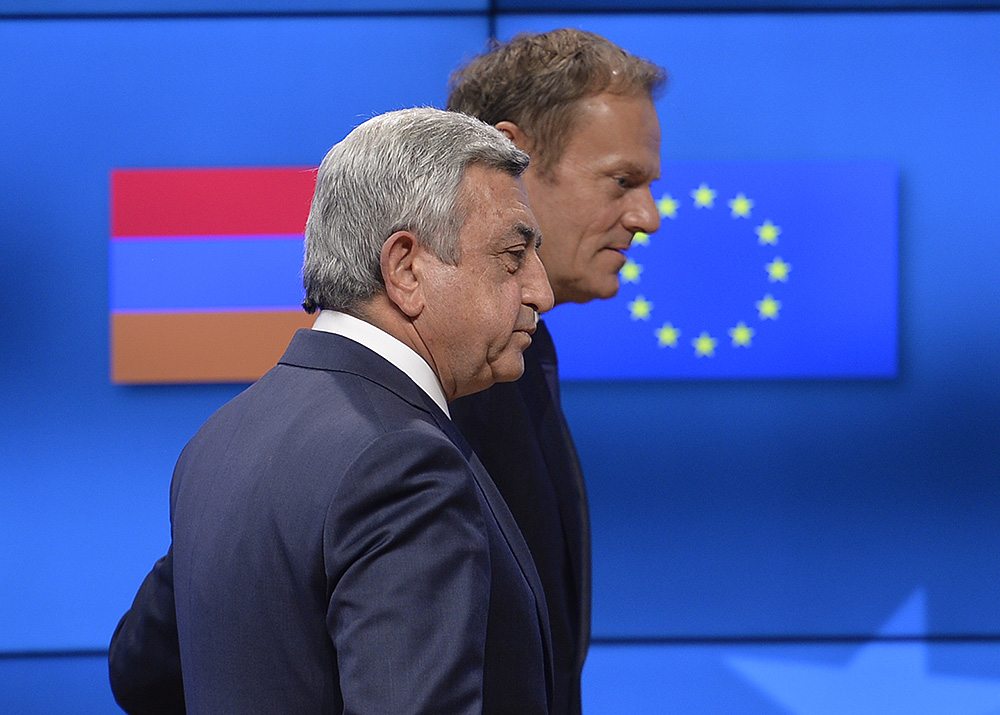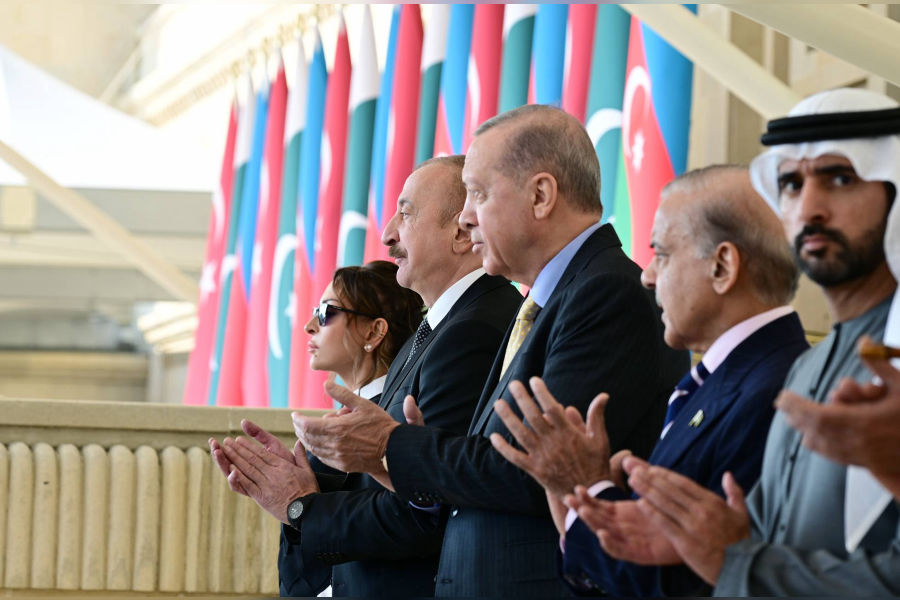
BRUSSELS, Belgium (A.W.)—On Feb. 27, the European Union (EU) and Armenia finalized a new agreement, which seeks to deepen political and economic ties between the two. “I am very pleased to announce today the conclusion of negotiations on the new EU-Armenia Comprehensive and Enhanced Partnership Agreement,” Donald Tusk, the President of the European Council said after talks with Armenian President Serge Sarksian concluded in Brussels on Feb. 27.

“The EU is already the first trade partner of Armenia, its first international donor, and strongest supporter to reforms. We intend to expand these relations further in the coming years and have encouraged Armenia to continue reforms across a range of issues, including economic development, the business environment, the judiciary, human rights, the fight against corruption, and measures to ensure free and fair elections,” Tusk added during the joint press conference with Sarksian.
Commenting on the talks, Sarkisian announced the agreement and said that it reflects the “real scope and depth” of the bilateral relations. “[T]he core issue of today’s meeting was the new framework agreement between Armenia and the EU. Today I am pleased to announce that the parties have completed the negotiations. The new legal document – Comprehensive and Enhanced Partnership Agreement reflects the real scope and depth of the Armenia-EU relations,” Sarkisian said.
The new agreement comes more than a year after Armenia’s controversial accession to a Russian-led trade bloc. Sarkisian unexpectedly signed an agreement in Sept. 2013 to make Armenia part of the Russian-led Eurasian Economic Union (EEU), in a move that has been widely credited to strong Russian pressure.
The EU-Armenia deal is likely to be signed in May.
Below is Sarkisian’s statement on the new agreement in its entirety.
***
Once again I would like to extend my gratitude to the President of the European Council and our good friend Donald Tusk for both the invitation to visit Brussels and our detailed and open talks. I have met Mr. Tusk on numerous occasions both in his previous and current capacities. Indeed, I recall all our meetings with warmth. I appreciate the sincerity. Thank you very much.
As Mr. President noted, the core issue of today’s meeting was the new framework agreement between Armenia and the EU. Today I am pleased to announce that the parties have completed the negotiations. The new legal document – Comprehensive and Enhanced Partnership Agreement reflects the real scope and depth of the Armenia-EU relations.
At the same time it is worth mentioning that along with the framework agreement we have registered a significant progress in sectoral cooperation by signing both the COSME program (for the Competitiveness of Enterprises and Small and Medium-sized Enterprises) and the “Horizon 2020” program on innovation. Soon we will successfully complete the activities to join the agreement on Common Aviation Area and “Creative Europe” initiative, as well. Overall, the past two years were exceptionally active in the context of Armenia-EU cooperation: political dialogue has been significantly intensified, cooperation in various areas has expanded.
Indeed, together with Mr. Tusk we also discussed other issues on the Armenia-EU agenda; we touched upon the regional and international developments. In the near future we expect to launch visa liberalization dialogue enshrined in the Joint Declaration of the Riga Summit of Eastern Partnership Summit, which will greatly contribute to the widening and deepening of ties between our peoples.
As you know, the axis of our cooperation is the reforms being implemented in Armenia. During 25 years of Armenia’s independence the EU has always been with us and has been providing significant financial, technical and moral support. The results are visible in various fields: the areas of public administration, justice, agriculture, statistics, and government procurements have been improved; vocational education has been refined to meet the requirements of the labor market. Business environment and investment climate in Armenia have been improved as well. We are determined to advance this cooperation not only in the mentioned areas but also in other fields of mutual interest to register new achievements. Thank you for this assistance.
Within a month parliamentary elections will be held in Armenia, which will be the first one after the 2015 Constitutional reforms. While changing the state governance system, we have one vision – to make a strong step forward towards the further development and strengthening of democracy. To prepare for these elections the electoral system has undergone serious changes. A new Electoral Code has been adopted as a result of the consensus among all the political forces, serving as a firm basis for open, transparent and fairer elections. Our goal is to hold such elections so that to remarkably raise public trust towards the electoral procedures. To that end, we have invited and encouraged large participation of authoritative international observation missions in the upcoming elections, including from the European Parliament. At the same time we call on local observers and civil society representatives to be active.
I expressed my gratitude to Mr. Tusk that EU stands next to us in this important period for Armenia and provides significant resources for the implementation of the provisions of the Electoral Code. I am sure, the results of this assistance and our cooperation will be visible for everyone.
Naturally, during the talks we touched upon the Nagorno-Karabagh conflict and reaffirmed that it has no military solution. Even though the Armenian side is ready for reasonable mutual compromises, nevertheless, the issue is based on the right of the people of Artsakh (Nagorno-Karabagh) to determine its future through free expression of will. There can be no other approach. The right of people of Nagorno-Karabagh to self-determination is not only enshrined in international fundamental documents, it is also recognized and embodied in numerous statements of the OSCE Minsk Group Co-Chairs – the only specialized structure dealing with this conflict.
In other words, this is not only Armenia’s approach, it is the collective perception of the international community regarding this issue. We are thankful for the balanced stance of the EU on the peace process, and for trusting and supporting the OSCE Minsk group Co-Chairs.
In the end, I want to note that EU is an exemplary history of building civilized relations with its philosophy and idea behind. The European Union is a history of overcoming issues between neighbors through joint efforts, which leads to success – something we need so much today. We duly appreciate this achievement and together with you are ready to preserve and cherish it.
Thank you.










A step in the right direction.
It reduces the reliance on Russia.
Hopefully tangible results in economic development will happen.
Vart Adjemian
bravo…at the least, for the effort,
Anything that lessens Russian influence over Armenia can only be a good thing.